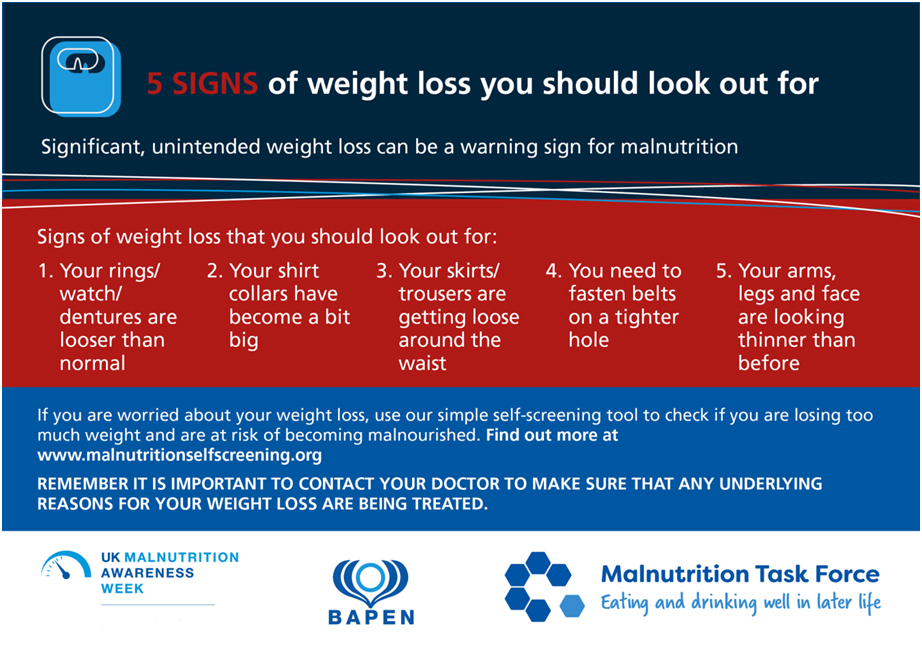Heading 2
Eat well, age well
Published on 5 October 2020
The NHS Western Isles Department of Nutrition and Dietetics is supporting UK Malnutrition Awareness Week, which this year runs between 5th-12th October 2020.
UK Malnutrition Awareness Week seeks to increase understanding of this important issue amongst general public, health and social care workers and community groups, and mobilise people to take action to identify and prevent malnutrition.
What is malnutrition?
Malnutrition is a common health problem which happens when you don’t get the correct amount of nutrients from your diet. In fact, did you know that over 3 million people in the UK are malnourished?
Malnutrition can make you more likely to get ill and may also slow down recovery time from any illness or surgery. Unplanned weight loss can also be a warning sign for malnutrition.
Malnutrition can affect anyone but it is common in older people and the socially isolated. It can happen over a long period of time so can be difficult to spot.
With 2020 obviously being a challenging year due to difficulties affecting us all from the coronavirus pandemic, now, more than ever, malnutrition poses a threat to many people who may have lost their usual support networks.
Throughout MAW 2020, we are calling on everyone to self-screen themselves, their loved ones and those they look after, to encourage people to recognise and understand the risks of undernutrition and dehydration and find out what they can do to prevent it. If you are worried that you or someone you care for could be at risk of malnutrition you can find out by using the self-screening tool available online at: www.malnutritionselfscreening.org/self-screening.html
A balanced diet is essential for health and wellbeing. When someone has a poor appetite and is malnourished, nutrient dense foods as well as drinks containing nutrition can help to improve energy intake without making portions too big to manage.
However, there are some simple ideas you can try if you have a poor appetite:
- eating “little and often” – 3 small meals plus 3 snacks are often easier to manage if large meals are off putting.
- making every mouthful count – using higher calorie foods like full fat milk, cheese and yoghurts instead of diet/low fat versions will increase your energy and protein intake
- enriching your food by adding cream, milk, butter or cheese to mashed potatoes, soups, and vegetables. An extra 500 kcal per day can help you gain up to 0.5kg or 1lb per week
- making the most of the ‘good days’ by preparing extra meals which you can store in the fridge/freezer as individual portions for ‘bad days’.
- buying a selection of fresh or frozen ready meals for times when you are not able to cook.
It can also be hard to prepare meals just for yourself and to eat on your own. if possible, why not try arranging to eat a meal together with someone on a video call.
If you have a poor appetite or find you are losing weight it is still important to drink plenty fluids. We should aim for 6-8 drinks each day. Many people drink mainly tea, coffee or water, but unfortunately these drinks provide little nourishment and can fill you up.
Swapping to drinks like full cream milk, milk shakes, smoothies, latte or cappuccinos can provide you with extra energy and protein, as well as keeping you hydrated.
If you are worried about yourself or anyone in your family becoming malnourished you can self-refer to your local dietitian at the NHS Western Isles Nutrition and Dietetics Department. Our dietitians are uniquely qualified to help you with your food choices, whatever your health concern may be.
For further information telephone 01851 708279 or email: wi-hb.dietetics@nhs.net

.
Background
UK Malnutrition Awareness Week (MAW) was founded by the Malnutrition Task Force and BAPEN (British Association of Parenteral and Enteral Nutrition) in 2018 to raise awareness of undernutrition and dehydration in the UK. The annual campaign seeks to increase understanding of this important issue amongst health and social care workers, community groups and the public, and mobilise people to take action to identify and prevent malnutrition.
- NEXT PAGE: Health Protection and Immunisation
- LAST REVIEWED ON: October 5, 2020